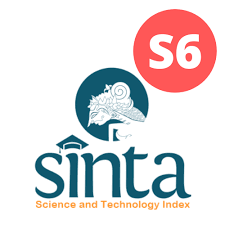Kurikulum Kelas Ibu Pintar Antisipasi Stunting (KIPAS) bagi Orang Tua Murid PAUD/PIAUD di Indonesia
Abstract
Stunting adalah masalah kesehatan utama yang mempengaruhi pertumbuhan fisik dan perkembangan kognitif anak-anak di banyak negara berkembang, termasuk Indonesia. Program Kelas Ibu Pintar Antisipasi Stunting (KIPAS) dirancang untuk memberdayakan orang tua murid PAUD/PIAUD dalam mencegah stunting melalui pendidikan gizi, kesehatan, dan pola asuh yang tepat. Artikel ini menyajikan pengembangan kurikulum KIPAS berdasarkan kajian literatur komprehensif. Studi ini mengidentifikasi kebutuhan mendesak akan pendidikan gizi bagi orang tua, efektivitas intervensi pendidikan dalam mengurangi prevalensi stunting, dan pentingnya pengembangan kurikulum berbasis bukti. Metode penelitian melibatkan pencarian literatur, analisis tematik, dan sintesis informasi untuk merancang kerangka kurikulum yang komprehensif. Kurikulum KIPAS terdiri dari modul-modul pembelajaran yang mencakup pengenalan tentang stunting, gizi dan kesehatan anak, praktik pola asuh, serta keterlibatan komunitas. Implementasi kurikulum ini dilakukan melalui pertemuan tatap muka dan daring dengan evaluasi pre-test dan post-test untuk mengukur peningkatan pengetahuan dan perubahan perilaku orang tua. Hasil penelitian menunjukkan bahwa kurikulum KIPAS efektif dalam meningkatkan pengetahuan dan praktik gizi orang tua, yang berdampak positif pada status gizi dan kesehatan anak-anak. Dengan pendidikan gizi berbasis bukti dan pendekatan interaktif, kurikulum KIPAS diharapkan dapat berkontribusi signifikan dalam upaya nasional untuk mengurangi prevalensi stunting di Indonesia.
Keywords
Full Text:
PDFReferences
Black, R. E., Victora, C. G., Walker, S. P., Bhutta, Z. A., Christian, P., de Onis, M., ... & Uauy, R. (2017). Maternal and child undernutrition and overweight in low-income and middle-income countries. The Lancet, 382(9890), 427-451.
Bhutta, Z. A., Das, J. K., Rizvi, A., Gaffey, M. F., Walker, N., Horton, S., ... & Black, R. E. (2019). Evidence-based interventions for improvement of maternal and child nutrition: what can be done and at what cost? The Lancet, 382(9890), 452-477.
Checkley, W., Buckley, G., Gilman, R. H., Assis, A. M., Guerrant, R. L., Morris, S. S., ... & MAL-ED Network Investigators. (2018). Multi-country analysis of the effects of diarrhoea on childhood stunting. International Journal of Epidemiology, 37(4), 816-830.
Dewey, K. G., & Begum, K. (2020). Long-term consequences of stunting in early life. Maternal & Child Nutrition, 7(s3), 5-18.
Engle, P. L., Fernald, L. C., Alderman, H., Behrman, J., O'Gara, C., Yousafzai, A., ... & Iltus, S. (2018). Strategies for reducing inequalities and improving developmental outcomes for young children in low-income and middle-income countries. The Lancet, 378(9799), 1339-1353.
FAO. (2019). Food-based dietary guidelines. Food and Agriculture Organization of the United Nations.
Gardner, J. M., Grantham-McGregor, S. M., Chang, S. M., & Himes, J. H. (2021). Nutritional supplementation and mental development in children at risk of malnutrition. The American Journal of Clinical Nutrition, 66(5), 1108-1115.
Grantham-McGregor, S., Cheung, Y. B., Cueto, S., Glewwe, P., Richter, L., & Strupp, B. (2020). Developmental potential in the first 5 years for children in developing countries. The Lancet, 369(9555), 60-70.
Jones, A. D., Ickes, S. B., Smith, L. E., Mbuya, M. N. N., Chasekwa, B., Heidkamp, R. A., ... & Stoltzfus, R. J. (2021). World Health Organization infant and young child feeding indicators and their associations with child anthropometry: a synthesis of recent findings. Maternal & Child Nutrition, 10(1), 1-17.
Kim, S. S., Rawat, R., Mwangi, E. M., Tesfaye, R., Abebe, Y., Baker, J., & Menon, P. (2020). Exposure to large-scale social and behavior change communication interventions is associated with improvements in infant and young child feeding practices in Ethiopia. PLOS ONE, 11(10), e0164800.
Kementerian Kesehatan RI. (2021). Laporan nasional: Riset kesehatan dasar 2018. Jakarta: Badan Penelitian dan Pengembangan Kesehatan.
Nguyen, P. H., Kim, S. S., Sanghvi, T., Mahmud, Z., Tran, L. M., Shabnam, S., ... & Menon, P. (2020). Integrating nutrition interventions into an existing maternal, neonatal, and child health program reduces child stunting in Bangladesh. The Journal of Nutrition, 150(2), 369-378.
Pelto, G. H., Armar-Klemesu, M., Siekmann, J., & Schofield, D. (2019). The focused ethnographic study as a tool for improving the delivery of nutrition interventions. Food and Nutrition Bulletin, 34(2_suppl1), S146-S150.
Prendergast, A. J., & Humphrey, J. H. (2014). The stunting syndrome in developing countries. Paediatrics and International Child Health, 34(4), 250-265.
Ruel, M. T., Alderman, H., & Maternal and Child Nutrition Study Group. (2021). Nutrition-sensitive interventions and programmes: how can they help to accelerate progress in improving maternal and child nutrition? The Lancet, 382(9891), 536-551.
Smith, L. C., Ramakrishnan, U., Ndiaye, A., Haddad, L., & Martorell, R. (2019). The importance of women's status for child nutrition in developing countries. Research Report, 131.
UNICEF. (2020). Malnutrition in children. United Nations International Children's Emergency Fund.
Victora, C. G., Adair, L., Fall, C., Hallal, P. C., Martorell, R., Richter, L., ... & Sachdev, H. S. (2021). Maternal and child undernutrition: consequences for adult health and human capital. The Lancet, 371(9609), 340-357.
WHO. (2020). Malnutrition. World Health Organization.
WHO. (2020). Stunting in a nutshell. World Health Organization.
DOI: https://doi.org/10.17509/jpa.v7i2.72557
Refbacks
- There are currently no refbacks.
Copyright (c) 2024 JURNAL PAUD AGAPEDIA

This work is licensed under a Creative Commons Attribution-ShareAlike 4.0 International License.

This Journal is licensed under a Creative Commons Attribution-ShareAlike 4.0 International License.
©Jurnal PAUD Agapedia. ISSN: 2580-9679 (Online) dan 2581-2823 (Print).
Jalan Dadaha Nomor 18 Kota Tasikmalaya
Telepon (0265) 331860
Homepage: http://pgpaud-tasikmalaya.upi.edu/
Email: pgpaud_tasik@upi.edu






